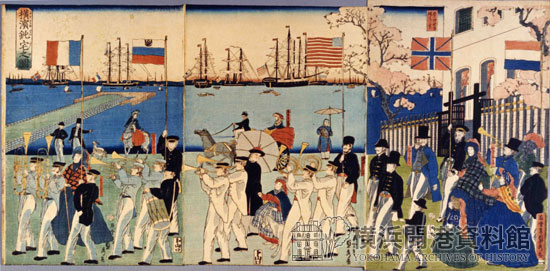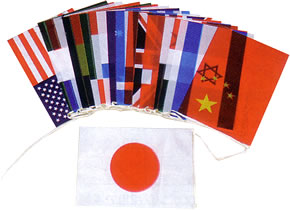

 Episodes - Desperate War of Japan in the Pacific -
Reports
aboutMe
Episodes - Desperate War of Japan in the Pacific -
Reports
aboutMe
 |  |
| 5-power flags | Bankoku-ki |
Japanese people had done festivals of farming rice for a long times. The most important festivals are in spring and fall. Commons enjoyed seeing children playing the gyms in a field of an elementary school in spring and fall. Parents rested farming whole a day. Every school all over Japan showed chained flags called bankoku-ki(literally 10 thousand nations flags) in the mid of Meiji era. Expo was translated into bankoku hakurankai.
Once a smart bureaucrat translated 'League of Nations' into 'Kokusai (International) Renmei (League).' Japanese people like the word, Kokusai. Some universities have a faculty of Kokusai. I do not know what to study at the faculty. At last a princess have entered ICU (International Christian University) for the first time, though princes and princesses entered Gakushuin usually. Boy students of Gakushuin wear a traditional IJN officer style uniform even now, as Mikado Akihito wore it when childhood. Gakushuin was not for commons but Peers School before the Pacific War.
Powers admitted Japan as one of powers after the Japanese-Russo War. But all the 5 nations above the picture became the enemy of Japan in the Pacific War, though Japan had not been able to withdraw the troops in China. How leaders of Japan thought cease fire against US and UK, when Government broke up the war? Government declared the Pacific War (Dai Toua Sensou) without referring to international law, while leaders of Meiji declared the Japanese-Qing War and the Japanese-Russo War under international law.
Matsumoto, p289-292
League of Nations
Oyoso Kokusai jyouki(international rule) no hani ni oite issai no syudan wo tukusi, Isan nakaramu koto wo kiseyo.
[10th Feb 1904, Japanese-Russo War]
International rescue (Kokusai kyujyo-tai)
| Parties | Ratification |
| Spain | 1930Aug06 |
| Switzerland | 1930Dec19 |
| Italy | 1931Mar24 |
| Serbia (Republic of) | 1931May20 |
| Portugal | 1931Jun08 |
| Australia | 1931Jun23 |
| India | 1931Jun23 |
| New Zealand | 1931Jun23 |
| South Africa | 1931Jun23 |
| United Kingdom | 1931Jun23 |
| Norway | 1931Jun24 |
| Sweden | 1931Jul03 |
| Latvia | 1931Oct14 |
| Romania | 1931Oct24 |
| USA | 1932Feb04 |
| Brazil | 1932Mar23 |
| Belgium | 1932May12 |
| Poland | 1932Jun29 |
| Mexico | 1932Aug01 |
| Denmark | 1932Aug05 |
| Netherlands | 1932Oct05 |
| Canada | 1933Feb20 |
| Chile | 1933Jun01 |
| Egypt | 1933Jul25 |
| Germany | 1934Feb21 |
| Turkey | 1934Mar10 |
| Iraq | 1934May29 |
| France | 1935Aug21 |
| China | 1935Nov19 |
International song
When I got a job in a company of Japan, We have to learn singing a song of May Day, being royal to the labor union. The song was made in 1922. I do not remember all, but I remeber a phrase, 'Wake up, internationl labors! (tate bankoku no roudou-sha).' The International was a national anthem of Soviet Union. We say union kumiai. A lots of Yakuza groups call themselves xxxkumi.
After the Pacific War, Japanese people also liked a word, culture 'bunka'. Now is another word, global 'guroubaru'. An British ambassador wrote an opinion on Mainichi Newspaper in 2008. He suggested to 'international' 5 times and 'global' twice.
POW
Government signed Convention relative to the Treatment of Prisoners of War on 27 July 1929. But Mikado did not ratify, because Privy Council did not agree. Then Deputy Foreign Affair Minister requested an opinion to Army and Navy. Deputy Navy Minister replied negative. He told 4 reasons to oppose the treaty on 15 November 1934.
US asked Government how to treat POW via Switzland on 27 December 1941 as well as UK via Argentina on 3 January 1942. Government replied Switzland and Argentia "mutatis mutandis". Japan and US agreed how to treat civilians in the Pacific War on February[1]. A Japanese official executed a representive of ICRC in Borneo on 13 May 1943.
Horyo Shoguhou
Shin turezuregusa
After the Pacific War, Japan ratified Fourth Geneva Convention (1949) on 21 October 1953. Japan ratified addtitional Protocol I relating to the Protection of victims of international armed conflicts and Protocol II relating to the protection of victims of non-international armed conflicts on 28 February 2005.
Geneva Conventions
[1] Ohuchi, p197